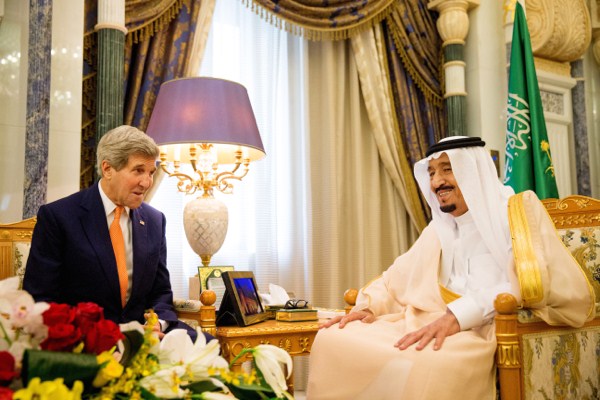Last week, Saudi Arabia’s new monarch, King Salman, replaced Crown Prince Muqrin—who had been chosen by Salman’s predecessor, the late King Abdullah—with 55-year-old Mohamed bin Nayef as next in line to the throne. He also installed his own 29-year-old son, Mohamed bin Salman, as deputy crown prince. The royal shuffle was presented by palace loyalists as an attempt to stabilize Saudi succession for the next few decades, consolidate power and inject what King Salman seems to believe is a greater sense of stability in the kingdom’s internal affairs. But it also marks an important shift in the monarchy’s trajectory. Although it remains unclear to what extent this consolidation may destabilize internal royal politics, it is sure to have ripple effects throughout the Middle East and in bilateral relations with the United States.
In just four months since succeeding Abdullah, King Salman has not only radically reshuffled the palace hierarchy, but has taken Saudi Arabia to war in Yemen and increased support to Syrian rebels to counter Iran. It is no secret that the ailing 79-year-old monarch’s decisions have been strongly influenced by the recently elevated crown prince and his deputy, the chief architects behind the kingdom’s new activist role in regional affairs. At the same time, though, they appear inclined to continue cooperating with the U.S., despite talk that the Yemen intervention is a sign of Saudi Arabia going its own way. The coming year will provide crucial tests for Saudi Arabia to achieve tangible results in its regional policy, and the steps that Riyadh takes will have a major impact on its relations with Washington.
King Salman’s shakeup comes at a time of continued Middle East upheaval. For much of the past decade, Saudi Arabia has fallen short of achieving its goals on key regional fronts, including containing Iran and advancing Arab-Israeli peace. Yet it has also taken assertive, possibly reckless steps in the hope of re-establishing the regional status quo from before the Arab uprisings, such as openly sending troops to quell a Shiite uprising in neighboring Bahrain in 2011. Perhaps for this reason, King Salman saw the need to groom as successors trusted individuals from the next generation who can tackle fast-moving regional crises more nimbly.

